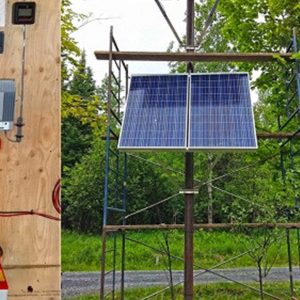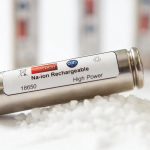Inverters play a vital role in solar energy systems, converting the energy produced by solar panels into a form that can be used to power our homes and businesses. There are different types of inverters on the market, the two main ones being hybrid inverters and off-grid inverters. Hybrid inverters offer great flexibility to Quebecers. Able to connect to the power grid while storing excess energy in batteries, they guarantee continuous power, even during harsh Quebec winters or during service interruptions. In addition, during the sunny months, the stored energy can potentially be sold to the grid, generating savings. However, the need for batteries can lead to higher upfront costs and requires regular maintenance to ensure optimal performance.
On the other hand, off-grid inverters are ideally suited for rural areas of Quebec where access to the power grid may be limited. They offer complete independence, saving you from worrying about network fluctuations. However, this independence comes with increased responsibility: it is imperative to properly manage and maintain your system to avoid any interruption of power.
 1. Introduction to Solar Inverters
1. Introduction to Solar Inverters
Solar inverters are key components of solar energy systems, as they convert the direct current produced by solar panels into usable alternating current. There are two main types of inverters that are widely used: hybrid inverters and off-grid inverters.
2. What is a hybrid inverter?
Hybrid inverters are versatile devices that combine the functionality of conventional solar inverters with those of storage batteries. They not only convert solar energy into alternating current, but also store excess energy in batteries for later use.
3. Advantages of Hybrid Inverters
Opting for hybrid inverters is synonymous with several advantages. These inverters promote self-consumption, allowing you to take full advantage of the energy produced by your solar panels. This feature naturally reduces your dependence on the power grid. In addition, by having the ability to store excess energy, hybrid inverters ensure energy security, which better prepares you for possible power outages. Financially, this energy reserve can also be sold to the grid, providing an opportunity for further savings.
However, hybrid inverters are not without their drawbacks. Purchasing and installing such a system, especially because of the batteries required, can be expensive. In addition, regular maintenance of batteries is essential to ensure their longevity and optimal functioning.
5. What is an off-grid inverter?
Off-grid inverters, also known as stand-alone inverters, operate independently of the power grid. They are used in areas where network access is limited or non-existent.
6. Advantages of Off-Grid Inverters
Off-grid inverters, or stand-alone inverters, operate independently of the power grid. They are particularly useful in areas where the network is difficult to access or completely absent. One of the main strengths of these inverters is the energy independence they offer, a valuable feature especially in remote locations. And even if the grid fails, you still have a reliable source of power. Flexibility is also a major advantage of these systems, as you have the freedom to fully customize your energy approach.
Nevertheless, it should be noted that these benefits come at a price. Off-grid inverters require significant upfront investments. In addition, the management and maintenance of these systems requires special attention to prevent possible complications.
8. Comparison Between Hybrid and Off-Grid Inverters
When choosing between these two types of inverters, it’s important to consider your energy needs, location, and budget. Hybrid inverters are ideal for those who want to maximize self-consumption, while off-grid inverters are suitable for remote areas with no grid access.
How to choose between the two types of inverters?
Making the right choice between the different types of inverters depends largely on your personal needs and the specifics of your situation. First and foremost, it is essential to assess your energy needs. Ask yourself if your goal is to be completely independent of the power grid or if a hybrid solution would be a better fit. The location of your home also plays a crucial role. For example, for those who live in remote areas where grid access is limited or non-existent, an off-grid inverter would likely be the best option. Finally, keep your budget in mind. While some inverters may have a higher upfront cost, maintenance expenses or long-term savings may justify this initial investment.
Factors to Consider When Buying a Solar Inverter
Buying a solar inverter is an important decision that deserves careful consideration. Among the aspects to look at is the load capacity of the inverter, which should match the size and output of your solar installation. In addition, its efficiency, which determines how much solar energy is converted into usable electricity, is also a crucial factor. Durability is another important consideration, as a durable inverter will minimize the need for replacement or repair. Finally, opt for an inverter with monitoring features, this will allow you to track and optimize your system’s performance in real-time.
Inverter installation and maintenance
Installing a solar inverter is a task that requires specific expertise. It is therefore recommended that you hire qualified professionals to ensure that the inverter is properly installed and optimized for your solar system. Hybrid inverters, in particular, require careful configuration, especially when it comes to batteries, to ensure their performance and longevity.
Maximizing the efficiency of your solar energy system
Optimizing your solar energy system is the key to getting the most out of it. This includes regular performance monitoring, which can often be achieved through integrated apps or systems that come with your UPS. Additionally, regular maintenance, such as cleaning solar panels to prevent dirt or debris buildup, can significantly improve their efficiency. Finally, make sure that your system is properly sized for your energy needs, to avoid energy waste or shortage.
The Future of Solar Inverters
As technology advances, we can expect to see considerable improvements in the field of solar inverters. These advancements will not only increase their efficiency, but also their accessibility, making solar energy even more affordable and attractive to a wider audience. Future innovations could also incorporate more advanced energy management features, providing users with more precise control and better optimization of their energy consumption.
14. Frequently Asked Questions (FAQs)
Q1: Can I install a hybrid inverter myself?
A1: Technically, it is possible to install a hybrid inverter yourself if you have the necessary knowledge and experience in electricity and solar systems. However, for safety reasons and to ensure optimal system performance, it is highly recommended to hire a qualified professional for installation.
Q2: Can off-grid inverters be connected to the grid in case of emergency?
A2: Inverters designed specifically to be off-grid typically cannot be connected directly to the grid without modifications or additional equipment. If you plan to have the ability to connect your system to the grid, you should consider a hybrid UPS that is designed to operate both off-grid and grid-connected.
Q3: Do hybrid inverters work with all types of solar panels?
A3: Most hybrid inverters are designed to be compatible with different types of solar panels. However, it is always important to check the technical specifications of the inverter and make sure that it is suitable for the types and configuration of the panels you have or plan to install.
Q4: How long do hybrid inverter batteries last?
A4: Battery life depends on several factors, including the type of battery (e.g., lead-acid, lithium-ion), frequency of use, depth of discharge, and environmental conditions. In general, hybrid inverter batteries can last between 5 and 15 years, but this can vary depending on the conditions mentioned.
Q5: Are off-grid systems cost-effective in the long run?
A5: The profitability of off-grid systems depends on several factors, including the initial cost of the system, the savings from avoiding grid connection, maintenance costs, the lifespan of the system, and the cost and availability of electricity in your area. In remote areas where grid connection is expensive or impossible, an off-grid system can be very cost-effective. However, it is important to do a detailed analysis of the costs and benefits for your specific situation.
Publications similaires :
- Saving with Solar Energy: The Crucial Role of Quality Lithium Batteries and Inverters
- Why the Quality of Your Inverter Is Crucial for Your Battery System
- Choosing the Ideal Inverter: A Comparison Between Hybrid and Off-Grid Inverters
- The Cost of Non-Quality: Why Investing in Quality Inverters Can Save You in the Long Run

 1. Introduction to Solar Inverters
1. Introduction to Solar Inverters

